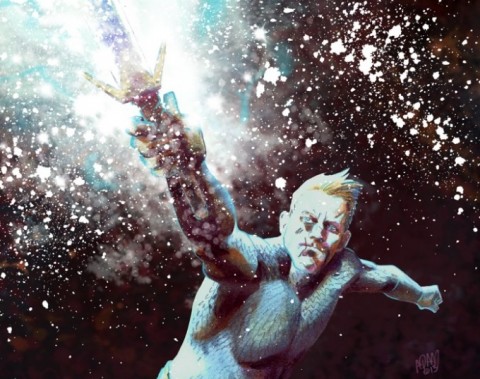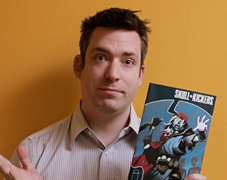
Comic books are not exclusively defined by the exploits of superheroes and their costumed escapades. While the industry is surely dominated by the titles made by corporate publishers, tucked away in the unlit corners of creation rests the work of writers and artists whose work pushes the comic medium beyond the boundaries of its minimum safe distance.
Toronto-based comic scribe Jim Zub currently writes Skullkickers for Image Comics, a book he describes as a sarcastic love letter to the “Sword and Sorcery” fantasy stories he read growing up as a self-described multi-tiered nerd.
“Skullkickers…the way I always describe it is: it’s a buddy cop movie meets Conan the Barbarian,” Zub said of the series which recently reached its seventeenth issue. “It’s about two mercenary monster hunters who get themselves in big trouble and have to kill their way out. It’s really pulpy, it’s earthy and ridiculous, and really violent and sarcastic.”
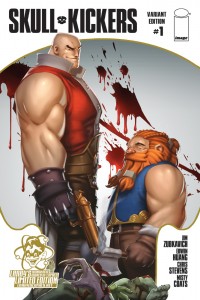
“I think we do a really, really fun book. I think we do a book that’s easily accessible and enjoyable,” he said. “This is an entertainment medium, and we’re here to entertain.”
Zub attributes the tone of his stories to his childhood affinity with fantasy storytelling, deriving directly from “Sword and Sorcery” novels and Dungeons & Dragons sessions with his friends.
“All the kinds of ridiculous things I would do or the types of stories we would create when I was a kid in Dungeons & Dragons sessions, or just when I would see movies or read books, all of those influences really informed the way I think about adventure or the way I think about action or the way I think about characters in the stories I’m writing now.”
Originally conceived as a five issues mini-series, Skullkickers’ popularity both with fans and within Image Comics led to it being extended beyond its original story arc.
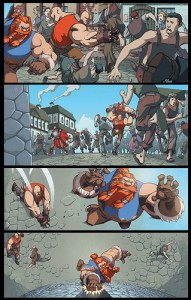
“As the series did well, Eric Stevenson, the head publisher at Image asked if we wanted to keep it going,” Zub recalled. “I had to build a much larger story and understand where I wanted to go with it. So instead of just making a rambling, over-the-top, ridiculous adventure, it was about ‘what is the long-term plan?'”
After the fifth issue, Zub noted how he sat down with his collaborators and began to architect a larger story they would like to tell, focusing in on how they had already stepped beyond the pre-conceived notions of fantasy elements and storytelling, and defining how they could amp up those dynamics that much further.
“It’s been sort of a challenge but it’s something I’m really excited about. Once people realized that not only were we having this really fun adventure book, but that it was going to get bigger and crazier and that we had a larger plan, I think more and more people have appreciated the little subtleties in there,” said Zub.
Zub said he’s particularly enjoyed utilizing plot points that seemed inconsequential in early issues, but have turned into bigger, more crucial plot elements as the series continually develops.
Despite only being first conceived as a shorter story, since he’s sat and developed the title it’s morphed into a much more expansive tale. Yet despite its successes, Zub said the story will have a definitive conclusion.
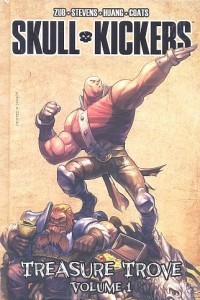
“The master plan right now is 36 issues, which will be six story arcs, so that’s where I want to go with it,” Zub said. “We just finished arc three, so we’re at the half-way point of the entire series and we’re working away on arc four. So within the next year-and-a-half we’re going to have the whole Skullkickers adventure story delivered to the audience.”
Zub said there’s a measure of satisfaction in delivering a finite story to readers who choose to invest themselves in his work.
“Having that finite ending really allows you to plan and foreshadow it and build multiple layers into it in a way that a book that never ends can be difficult to keep fresh,” he said. “This will be a complete thing; this is a story we’re trying to tell and I think that’s really a compelling package to be able to deliver to people.”
“It’s also nice in terms of planning: to plant those seeds and watch them grow later in the story because you know you’re going to pay them off.”
Zub said that element is missing from serialized comics, where if you’re working on the latest story of a character that isn’t your own, you could create something and it may be undone, changed or written out later because it isn’t your property.
“With a creator-owned book, and with it being all mine, I know what’s going to happen and I’m in control of it all the way to the end,” he said.
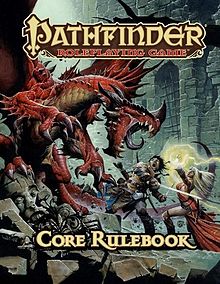
In addition to Skullkickers, Zub also writes Dynamite Comics‘ Pathfinder title, a series based off the fantasy role-playing game of the same name that was developed by Paizo Publishing in 2009. The comic book project actually came about while Zub was promoting Skullkickers at Gen Con 2011. Eric Mona, a head publisher at Paizo, came up to Zub and told him he was really enjoying the title.
“I’ve known him for years, he really liked Skullkickers, so he came by and chatted with me and he just said, ‘I’m really loving the book, I think it’s really awesome.’ And then he said, ‘you know, we’re really looking at moving into comic books with Pathfinder, would you recommend anyone? Do you know anyone who would be interested?” And I said, ‘actually, I would. If it fits my schedule I’d be totally up for it,'” Zub said.
Within a couple of months of their conversation at Gen Con, Mona contacted Zub shortly after Paizo reached a publishing deal with Dynamite. Zub said he put together a very straight-forward pitch outlining what he would do with the series and the approach he would take with it. With all parties in support of his pitch, the project was green-lit.
“Paizo really liked it. Dynamite really liked it and it was one of the smoothest projects I have ever pitched on,” he said.
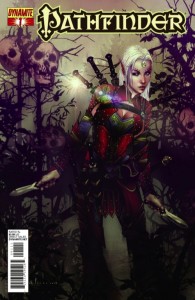
Differing from his work on Skullkickers, Zub describes Pathfinder as a more serious take on fantasy, characterizing it as a very character driven, classic fantasy adventure tale that is forward-thinking in its storytelling.
“Pathfinder as a game is all about working with your friends, creating your own characters and creating your own stories. It’s a really sprawling, incredible world for fantasy adventure,” he said. “It’s about great characters, it’s about a really compelling world and about fun storytelling.”
Considering the denseness of the mythology housed within the source material, Zub wanted to avoid dumping too much information onto new readers.
“There’s so much detail to the world, and really that’s an amazing part of it, but we wanted the comic series to be new reader friendly. So you pick up issue one, you know exactly where the beginning of the story is, who these characters are and be able to follow along and get into it,” he said. “We didn’t want it to only be for people who already knew the game, and we didn’t want to overload people with tons of detail.”
In adapting a very deep mythological concept for comics, Zub decided to focus more on the characters within the story, making them a central plank in the development of the book’s plot.
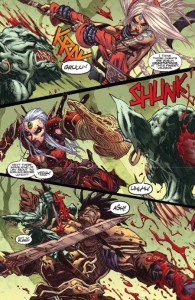
“We start with these really great, compelling characters and then we start to reveal more depth to them,” said Zub, who plans to delve deeper and deeper into the histories of each character as the series continues on, exploring the experiences that have shaped their personalities, how they perceive the larger world and how the larger world affects their evolution as individuals.
Zub has emphasized the humanity of his characters, indulging classic questions of the human condition itself despite its analysis being set in a completely fantasy-based environment.
“One of the characters is an elf, and she’s already lived for hundreds of years. She looks very youthful, she looks like a teenager, but she’s actually been around for over a hundred years,” said Zub. “She’s watched friends grow old and die, and is now continuing on with her life. How does that affect you as a person, as a character versus a normal human being?”
As with any work of art, no matter how high the quality of the work, as an independent creator promotion is a critical element that can make or break a book. Zub feels he’s been lucky though, especially where Pathfinder is concerned.
“Pathfinder has a really robust, large and dedicated fan-base, and they’ve been doing a good job of beating the drum (online),” said Zub, who is very pleased with how well the first issue of the series has sold. “The good thing is even though fantasy may not be as big a genre as superheroes in comic book shops, as a genre in terms of visibility right now, fantasy is huge.”
Zub pointed to fantasy phenomenons such as the Harry Potter books and films, the forthcoming Hobbit movie and the resounding success of Game of Thrones on television.
“People want great fantasy stories, you just got to get it to them,” he said.
Zub believes online outreach is an integral, titanic factor in his success, and has been very active in promoting his work through various online channels.

“We’ve been serializing early chapters of Skullkickers on our website…so people can pick up the story for free and get into it and grow attached to it,” said Zub, who has done countless interviews, podcasts and has even conducted contests to increase awareness of the title. “We recently did a contest for Skullkickers where in between each story arc we have an issue full of short stories, so we had a contest where people could submit their ideas and the best one would actually be put in the book.”
“So it could be your first professional comic work. We had over 300 entries for the contest, so it was an amazing way to let people know about the series.”
While the online element has been beneficial to the promotion of his work, Zub foresees it continuing to force an evolution in how comics are presented to readers.
“Digital is going to become more and more important because the outreach you can do online, as much as I love comic stores and as much as I love physical comics, the reality is, more people read comics online than buy them in shops,” said Zub. “That’s the reality of the industry right now.”
Zub believes the globalization of the comic book experience, aided by the internet, is a huge component of comic book promotion, especially since it’s easier to market your work to genre specific groups online. Given the lesser demand for fantasy comics in traditional comic shops, those stores may be less likely to carry your book. That makes online initiatives that much more important in his eyes.
“Kate Beaton does a comic strip online called, Hark! A Vagrant,” he said. “Her comics are literally sarcastic history comics, and if you were to pitch that to a publisher, they would never want to publish that and now she’s an award-winning author who has, and I’m not even exaggerating, millions of fans because she put it online and developed the audience.”
Zub said no one realized there was an audience for her work, and he thinks that type of marketing will become more important in the next few years as digital comics become even more normalized.
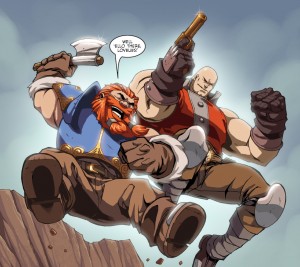
“Digital comics is the future in general, with people buying print collections of stuff they really love,” he said. “Right now you sample movies or TV shows digitally, and then you buy DVD box sets of the shows you really love, or CDs of the band that you really want to support, and you buy MP3 singles of everything else. Comics are going to go the same way. You’re going to have digital sampling and then archival sales to dedicated fans.”
Despite the success of Skullkickers and Pathfinder, Zub still looks ahead to future projects once his current titles eventually conclude.
“I’m actually developing a bunch of different stuff. I definitely want to go through different genres, I don’t want to just be doing fantasy,” he said. “I have a horror series and I want to do a mini-series. I have an idea for a sort of dystopian, kind of twisted take on pop-culture I want to do. I have another idea for a supernatural investigation series.”
He’s already starting to plan for his next projects by reaching out to artists and developing the ideas so that when they’re ready to publish, they’ll have full momentum behind them.
“Right now it’s this weird feeling where I know Skullkickers is eventually going to end, but I’m already starting to plant those seeds,” Zub said of planning new projects before his current title has even finished its run.

In the meantime, Zub is happy where he is with Skullkickers, and is more than happy to meet fans, and talk to potential fans about his work.
“One of my favourite things about doing the book is meeting the fans and meeting people at shows and talking to them directly,” said Zub, who relishes the opportunity to interact with readers and find out what they liked or didn’t like about the story. “When you work on these types of projects, you’re in isolation. You’re at home, you’re on email or you’re sending files around. There’s nothing better than recharging your batteries than by meeting people who are reading your work and are enjoying it.”
“That means the world to me, to meet people who love what I do and have them tell me that they want me to keep doing it.”



